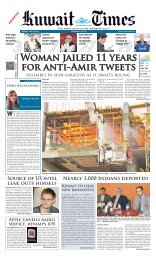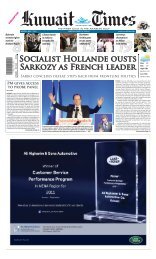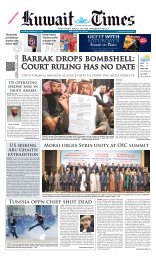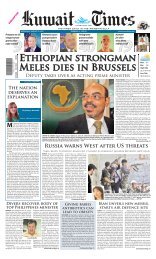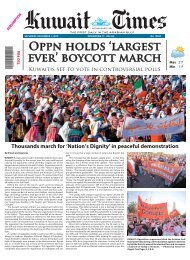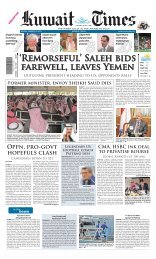You also want an ePaper? Increase the reach of your titles
YUMPU automatically turns print PDFs into web optimized ePapers that Google loves.
FRIDAY, AUGUST 31, 2012<br />
SEOUL: Hyundai Motor Co. and its<br />
labor union reached a tentative agreement<br />
yesterday to eliminate night<br />
shifts and increase wages, moving one<br />
step closer to end the company’s first<br />
strike in four years.<br />
The preliminary agreement means<br />
that workers will halt limited strikes<br />
they have been staging since July,<br />
which have resulted in 1.59 trillion<br />
won ($1.4 billion) of lost output for<br />
South Korea’s largest carmaker, the<br />
company said. Hyundai and union officials<br />
wrapped up their four-month<br />
negotiations and agreed to scrap night<br />
shifts starting March 2013. Hyundai<br />
will invest 300 billion won, or $264 million,<br />
in facilities to help it maintain the<br />
current level of output despite<br />
reduced working hours.<br />
The deal will be put to a vote by<br />
Hyundai’s more than 40,000 unionized<br />
workers on Sept. 3. Kwon Oh-il, an official<br />
at Hyundai’s labor union, said it<br />
was uncertain whether the workers<br />
would approve the terms.<br />
“In previous years, there were cases<br />
when the tentative deal had failed to<br />
win majority votes,” Kwon said by<br />
phone. Since July, Hyundai’s labor<br />
union staged a series of brief walkouts<br />
to put pressure on management during<br />
negotiations. Workers at Kia<br />
Motors Co. and General Motors Co. in<br />
Korea also have staged limited strikes<br />
to press demands for an end to night<br />
shifts and new wage terms.<br />
Earlier this month, unionized workers<br />
at GM’s Korea unit rejected a tentative<br />
deal reached between management<br />
and the union’s board. The union<br />
staged a partial strike Wednesday that<br />
Business<br />
Hyundai Motor reaches deal with labor union<br />
HAMI: This picture taken on August 6, 2012 shows workers<br />
checking on a solar panel at a field in Hami, China’s farwest<br />
Xinjiang region. German Chancellor Angela Merkel<br />
said yesterday that a dispute between Chinese and<br />
European solar panel makers should be solved via talks,<br />
not trade limits. — AFP<br />
HK shares slide, China<br />
lingers at 3-1/2-year low<br />
HONG KONG: Hong Kong shares closed at their lowest in a<br />
month yesterday, with bank shares hurting after disappointing<br />
earnings from China’s Agbank and property stocks slumping<br />
on media reports about imminent curbs on the sector.<br />
Turnover stayed weak, in line with low trading interest<br />
across asset classes this week ahead of today’s annual meeting<br />
of central bankers in Wyoming. The past two years,<br />
Federal Reserve Chairman Ben Bernanke signalled new policy<br />
easing. Onshore Chinese markets yesterday lingered at their<br />
lowest levels since early 2009, with the metals and mining sector<br />
weak as iron ore prices sank to near three-year lows on<br />
sagging Chinese demand.<br />
Hong Hao, chief strategist at Bank of Communications<br />
International Securities, said that A-share underperformance<br />
is making more people look into whether there are bigger<br />
structural problems in the Chinese economy.<br />
He suggested that for now, investors should stay defensive<br />
and brace for more downward revision of earnings. “If you<br />
don’t have to do anything, then don’t-unless you have a<br />
strong view on quantitative easing from the Fed,” Hong said.”<br />
But even then, I’m not risking my money for a 5 percent gain<br />
in the short term.” The Hang Seng Index shed 1.2 percent to<br />
19,552.9, the lowest close since July 27. It opened below its<br />
200-day moving average, now at 19,763.7, which triggered<br />
stop-losses in the index futures market at around 19,700. That<br />
caused losses to accelerate, traders said.<br />
The CSI300 Index of the top Shanghai and Shenzhen listings<br />
slipped 0.2 percent to 2,211.4, the lowest close since<br />
March 2009. The Shanghai Composite Index ended flat as<br />
bourse volume rose 19 percent from Wednesday, almost in<br />
line with its 20-day moving average.<br />
Mining companies were weak, with Citic Pacific down 4<br />
percent. But there was some respite for beleaguered steel<br />
companies, which need iron ore. Angang Steel jumped 4 percent<br />
in Hong Kong. Agricultural Bank of China (AgBank), the<br />
sector’s third-biggest lender, fell on a bigger-than-expected<br />
margin decline. Banks’ net interest margins measure loan<br />
profitability and are expected to shrink in the wake of China’s<br />
interest rate liberalisation, which has narrowed spreads<br />
between what banks pay depositors and what they charge<br />
borrowers. —Reuters<br />
BEIJING: Expressing alarm at Europe’s<br />
debt problems, Chinese Premier Wen<br />
Jiabao called on Greece, Spain and Italy<br />
to embrace budget cuts and get their<br />
finances in order after meeting yesterday<br />
with visiting German Chancellor<br />
Angela Merkel.<br />
Wen said Beijing is willing to keep<br />
buying European bonds but gave no<br />
sign Beijing will bail out the eurozone.<br />
Merkel was in Beijing for talks aimed at<br />
boosting trade and allaying Chinese<br />
fears about Europe’s heavy government<br />
debts. China has a stake in a resolution<br />
because Europe is its biggest export<br />
market and Beijing holds billions of dollars<br />
in European bonds.<br />
“The European debt crisis has continued<br />
to worsen, giving rise to serious<br />
concerns in the international community.<br />
Frankly speaking, I am also worried,”<br />
Wen told reporters. He cited uncertainty<br />
over whether Greece leaves the eurozone<br />
and whether Italy and Spain will<br />
take “comprehensive rescue measures,”<br />
a reference to spending cuts and tax<br />
increases to balance their budgets.<br />
“Resolving these two problems rests<br />
with whether Greece, Spain, Italy and<br />
other countries have the determination<br />
for reform,” the premier said. “Resolving<br />
the European debt problem requires fiscal<br />
tightening and finding balance within<br />
individual economies.”<br />
Wen’s comments were unusually<br />
pointed for China, which says governments<br />
should not interfere in each other’s<br />
affairs. But the country’s leaders are<br />
increasingly worried about the safety of<br />
their European debt holdings and<br />
European economies where Chinese<br />
companies are expanding.<br />
Wen said Beijing was willing to buy<br />
European bonds so long as it could evaluate<br />
the risks and to help the European<br />
Union, International Monetary Fund and<br />
European Central Bank - the so-called<br />
troika - support indebted eurozone<br />
countries “in overcoming hardships.”<br />
Wen made a similar pledge of possible<br />
Chinese aid to European bailout<br />
funds during Merkel’s last visit to Beijing<br />
in February but it is unclear what the<br />
communist government has done. The<br />
European Financial Stability Fund, set up<br />
to lend to troubled governments, says<br />
China and other Asian investors have<br />
bought 40 percent of its bonds but has<br />
released no other details.<br />
Merkel told reporters that while the<br />
crisis is not over, countries such as Italy<br />
and Greece were “on an intensive road<br />
of reforms. I am convinced that this will<br />
bear fruit.” Greek politicians agreed this<br />
week on an austerity package demanded<br />
by creditors but were negotiating<br />
details. Inspectors from the troika are<br />
due in Athens next month for a review,<br />
on which hinges a rescue loan installment<br />
of euro 31 billion.<br />
“I want Greece to remain part of the<br />
eurozone,” Merkel said. “I have at the<br />
same time indicated that credibility is<br />
very important in the eurozone.<br />
Therefore we expect the program to be<br />
implemented.”<br />
Ahead of Merkel’s visit, German officials<br />
told reporters Berlin wanted to<br />
reassure Beijing that European debt is a<br />
“safe and good investment.” Later, Wen<br />
and Merkel presided at a signing ceremony<br />
for billions of dollars in business<br />
deals - a regular event during visits by<br />
European leaders.<br />
Airbus Industrie, a unit of the French-<br />
German consortium EADS, committed<br />
to invest $1.6 billion in the second<br />
phase of an aircraft final assembly plant<br />
opened in 2008 in Tianjin, Wen’s hometown.<br />
A Chinese state company signed<br />
an agreement to purchase 50 Airbus jetliners<br />
valued at $3.5 billion.<br />
Volkswagen AG, Europe’s biggest<br />
the company said caused a loss in production<br />
of 15,000 vehicles. The strike is<br />
expected to make a dent on Hyundai’s<br />
bottom line for the current quarter.<br />
However, the company will likely meet<br />
its sales target this year because it<br />
exceeded its production target in the<br />
first six months of the year, which<br />
could make up for the lost output, analysts<br />
said. “The strike is unlikely to have<br />
much impact on its annual earnings,<br />
though it will affect its quarterly financial<br />
results,” said Suh Sung-moon at<br />
Korea Investment & Securities. — AP<br />
China’s Wen calls for<br />
action on Europe debt<br />
European debt crisis continues to worsen<br />
automaker, signed a deal to invest $219<br />
million in an “environmentally friendly<br />
production facility” and vocational training<br />
initiative, also in Tianjin. Eurocopter,<br />
another EADS unit, signed an agreement<br />
to build a $12.5 million production<br />
facility in China.<br />
Officials of the two governments also<br />
signed agreements to collaborate in<br />
biotechnology, electric vehicles, agriculture,<br />
education, labor and the environment.<br />
The next round in a regular series<br />
of Chinese-German meetings was<br />
scheduled for next year, but German<br />
officials say Wen asked Merkel to come<br />
early before the Communist Party<br />
begins a once -a-decade handover of<br />
power to younger leaders in October.<br />
Merkel met later Thursday with Xi<br />
Jinping, who is due to become party<br />
leader and president. The two-day visit<br />
comes as Beijing is struggling to pull<br />
China out of its deepest economic<br />
slump since the 2008 global crisis. The<br />
government has cut interest rates twice<br />
and is pumping money into the economy<br />
with a wave of investments by state<br />
companies.<br />
A Cabinet official said Wednesday<br />
that official measures are starting to<br />
take effect and growth was “stabilizing<br />
at a slow pace.” But corporate profits are<br />
down and a survey of manufacturers<br />
released last week showed future export<br />
orders have fallen. — AP<br />
BEIJING: German Chancellor Angela Merkel, left, shakes hands with Chinese<br />
Premier Wen Jiabao after a joint press conference at the Great Hall of the<br />
People in Beijing, China, yesterday. — AP





